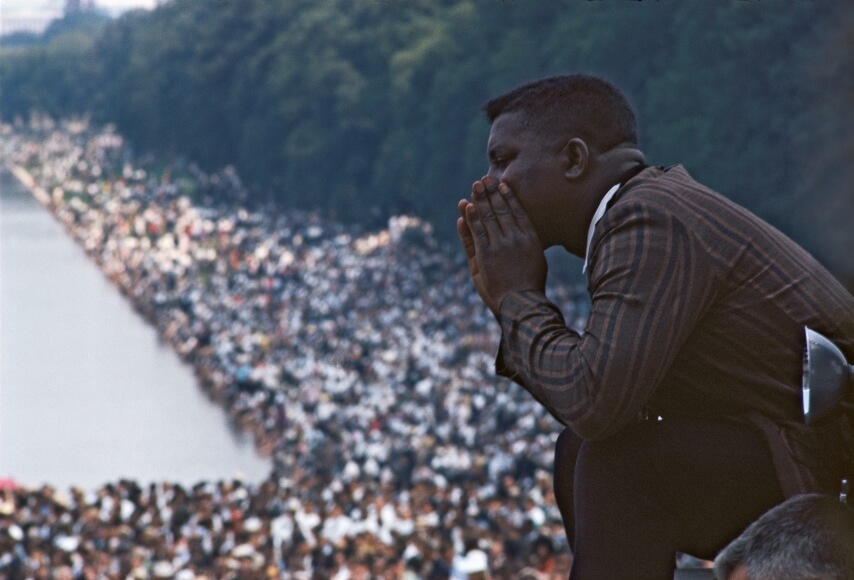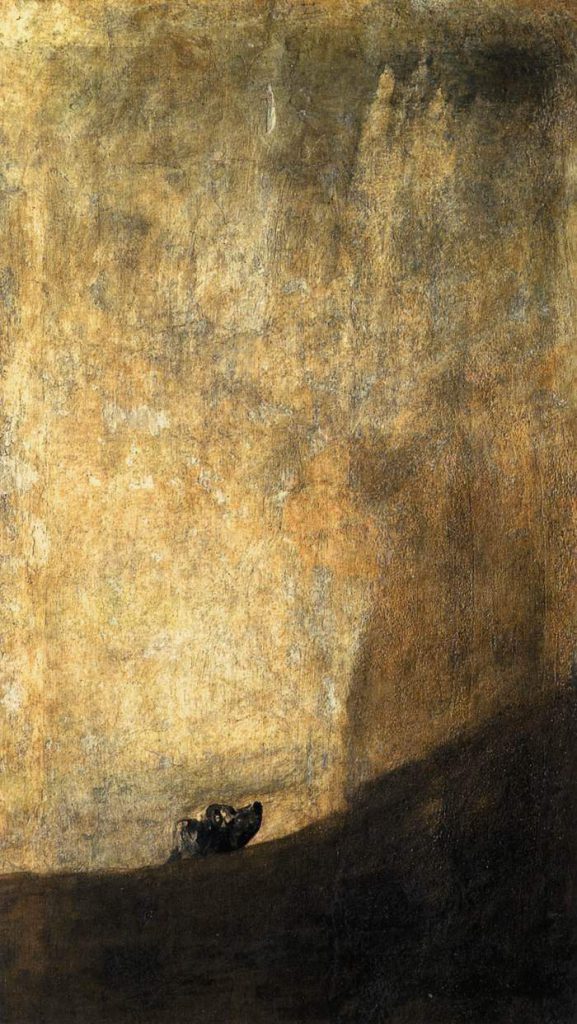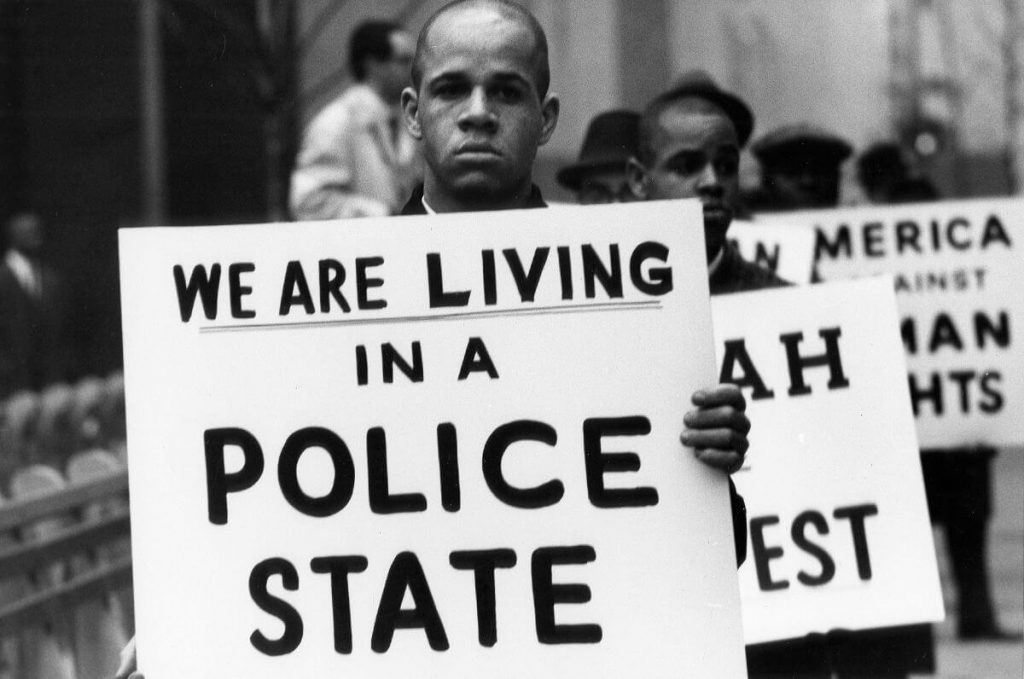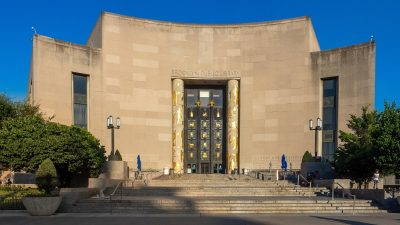Art in the Wake of Trump
I spontaneously bought a bottle of Moët, packaged in a bent-up box thick with dust, the afternoon of Tuesday, November 8. I was walking down Church Avenue in Kensington past my local pharmacy (where I was greeting with a “Salaam! Have you voted?”), a Bangladeshi dress boutique, a Polish deli, a halal butcher, a Jewish center, a 50-year-old pizzeria, when the surge of optimism rose in me. By Wednesday morning, I had taken the bottle out of the fridge and hidden it somewhere I couldn’t see. And I cried. I have cried so much since then.
To describe the events of last Tuesday as anything other than a tragedy is to lie. On Election Day, a new coalition of white voters—many of whom crossed party lines—elected an unstable, fraudulent, serial liar and misogynist who campaigned on racist nationalism. It is a resounding loss for everyone who believes that the United States is at its best when it is at its most diverse and most equitable, and a shift in power that deeply threatens this country’s most vulnerable. Many of us are afraid, all of us are uncertain of what will come next.
And so we turn to art: for comfort, for inspiration, for fuel. I asked writers to share what they first read, watched, listened to, and examined in the wake of this new and terrifying reality.


John Edgar Wideman, author of Writing to Save a Life: The Louis Till File
I wish a reliable refuge existed in some particular work of art—but of course, it doesn’t—except when I experience impossibly difficult circumstances and must imagine ways of keeping on, holding on, living, loving, no matter what—then art already existing and art still to be invented provides spaces where what I imagine seems possible.
Jelani Cobb, New Yorker staff writer and Columbia University professor of journalism
As the returns came in early on the morning of November 9, I obsessed over one question: do I actually believe the words of the civil rights songs I have heard all my life and played for students in my class? If I believe the morality of the words “Ain’t Gonna Let Nobody Turn Me ‘Round” then despair is not an option. If I give in to despondency then the people around us, those who we have seen be targeted and maligned in the past year, those who are truly vulnerable, will be left with no hope at all. I believe the words of those songs.
Nikole Hannah-Jones, staff writer at the New York Times Magazine
These past few days have been so very trying and, along with talking with my friends and family and writing, art has been my solace. Sonically I’ve taken comfort in the entire new Solange album, Sam Cooke’s “A Change Is Gonna Come,” and listening to my dad’s old War albums. As for literature—I’ve been rereading James Baldwin’s The Fire Next Time and Claudia Rankine’s Citizen.
Debbie Reese, book critic and publisher of American Indians in Children’s Literature
The words of Simon J. Ortiz, a poet, a dear friend, and an elder at Acoma Pueblo, help me find my footing. “Continuance” opens with: “We are all the People of this land. / We were created out of the forces of / earth and sky, the stars and water. / We must make sure that the balance / of the Earth be kept. / There is no other way.” He writes that we will struggle but that we must take great care with each other, and share our concern with each other, because we’re all one body of People. “We must fight against those forces / Which will take our humanity from us. / We must ensure that life continues. / We must be responsible to that life.”
Jonathan Lethem, author of A Gambler’s Anatomy
I recommend everyone read Robert Musil’s The Man Without Qualities immediately. Of course “immediately” is a strange command, I know, in the instance of a 1,400 page German modernist novel about the run-up to World War I, and I’m not sure how reading it will help, honestly, though it will give some perspective. Perhaps it is also therefore a good idea to volunteer at a food bank or women’s shelter or to participate in some other highly local form of communitarian mutual aid.
Tina Chang, Brooklyn’s poet laureate
I have thought, often, of the poem “Revenge.” Let me start by saying I wish no ill will on Trump, but I do not agree with his views and I do not consider him my personal elected official. I don’t think he is the right choice as commander-in-chief nor do I consider him sane. The final sentiments of this poem by Taha Muhammad Ali resonate with me and give me comfort. “At times … I wish / I could meet in a duel / the man who killed my father / and razed our home,” it goes, but then, “I’d add not a thing to his pain,” “I / convinced myself / that paying him no attention / in itself was a kind of revenge.” At this point in time, I prefer to pay Trump no attention at all and this is my act of resistance.
Emily Gould, author of Friendship
I went to see the Pipilotti Rist exhibition at the New Museum on Wednesday. I have always loved the way her videos both stimulate and soothe the senses. They remind me of the beauty that’s everywhere, even in things that are commonplace or ugly. Her aesthetic is funny and a little bit amateurish, playful and profound. Also, in several parts of the exhibit you can literally lie on a bed or on cushions on the floor looking at videos being projected on giant screens and, if you want, cry intermittently. Her close-up images of the natural and bodily worlds remind me of everything about everything on earth that’s worth fighting for and protecting, no matter how hopeless and angry and depleted we feel.
Brit Bennett, author of The Mothers
I woke up the morning after the election feeling sick and the only song I wanted to listen to is Kendrick Lamar’s “Alright.” It’s a song that has become a protest chant for the Black Lives Matter movement, it’s an affirmation of solidarity, it’s a reminder that, as Black people, we have been through hell and we will overcome together. The song opens with an allusion to one of my favorite books, The Color Purple. “Alls my life I had to fight,” Kendrick raps, because sometimes hope is not shallow or passive. Sometimes hope is a battle cry.
Yiyun Li, author of Kinder than Solitude
There is little comfort but the thought that the country is not crowning a king, that a president’s terms are finite, and that America has built a solid enough legal and cultural foundation that we would not end up with a dictator for life, as has happened and is still happening in other parts of the world. Since Tuesday, I have turned to Shakespeare’s Richard III, James Alan McPherson’s A Region Not Home.
Angela Flournoy, author of The Turner House
I would suggest looking at Gordon Parks’s photography of black life and the struggle for civil rights, reading the collected poems of Lucille Clifton, and studying as much James Baldwin as one can get one’s hands on.
Victor LaValle, author of The Ballad of Black Tom
I’m playing Stevie Wonder heavy. The song of this national moment should “He’s Misstra Know-It-All” from Stevie’s album Innervisions. It opens like this: “He’s a man with a plan/Got a counterfeit dollar in his hand.” And only gets more and more pointed from there. You’d swear Stevie knew Donald Trump was coming. Forget “Hail to the Chief,” this is the anthem of our 45th President.
Thomas Page McBee, author of Man Alive and Quartz’s editorial director for growth
I’m far from my books, working out of London, and as an editor at a news organization, all I’m reading about is this election. But for my new book, I’m re-reading Frankenstein and Dr. Jekyll and Mr. Hyde, which are indeed helping me make sense of toxic masculinity, but aren’t exactly comforting.


Julia Alvarez, author of Where Do They Go?
One of the fourteen Black Paintings that Goya painted directly on the walls of his home, late in life, when he was going deaf and thought he was going mad, Dog Drowning is a long, narrow canvas, almost all golden molten quicksand below and a matching sky ablaze above. Out of this morass the head of a small dog pokes out. The dog’s dark eyes gaze up, pleading for help, but no rescuer appears, not in the canvas anyhow. But that look itself is salutary, so naked, so in extremis, and yet somehow so foolishly hopeful. It stirs compassion. “History says don’t hope/ on this side of the grave,” Seamus Heaney wrote in “The Cure from Troy,” another work of art I have read and reread in the aftermath of an appalling election defeat. “But then, once in a lifetime/ the longed-for tidal wave/ of justice can rise up/ and hope and history rhyme.” We will all drown unless we all keep working towards that rhyming time.
Summer Brennan, author of The Oyster War
The truth is that I haven’t found any works of art useful. Maybe Joy Harjo’s “She Had Some Horses,” which sums up how I feel about America right now. People should read Elizabeth Kolbert’s The Sixth Extinction. I care deeply about the social issues at stake, but a destroyed planet cannot be undone with reelection.
Rahawa Haile, writer
Of late I’ve been reading Aracelis Girmay’s poetry, particularly her collection the black maria. It will shock absolutely no one that my eyes are trained on Africa as much as America in the wake of this election. Girmay’s work balances mourning and strength in a way that feels essential for moving forward in the coming years, even when forward looks like a tomb, like a dinghy, like God help us all.
Rion Amilcar Scott, author of Insurrections
Whenever I feel troubled—as I do now like never before—I turn to James Baldwin, thumbing through his collection of previously uncollected works, The Cross of Redemption. I saw snippets of some of the book’s essays floating around social media after the announcement of the awful news. Baldwin always seems like he’s writing for the current times, but it’s a mistake to think him prescient. What seems like clairvoyance is just the reality that things, at their core, haven’t changed much since the fifties and sixties when Baldwin was writing. Robert Hayden’s poem, “Ice Storm,” about a tree surviving the winter after being weighted down with ice, gave me brief hope. Other than that I’ve been listening to Public Enemy, dead prez, Killer Mike. Nothing has settled me.
Taffy Brodesser-Akner, contributing writer to GQ and the New York Times Magazine
When I was in film school, I had a computer crash the night before a big screenplay was due. That night, I worked ‘til five AM trying to recreate it. I told my teachers what happened, and they didn’t believe me. “I swear it was full-length,” I said. And they (it was a master class, two teachers) looked at each other with barely concealed contempt. My friend Jon raised his hand and said he’d seen the first version, that it was good. With Jon’s endorsement, they finally relented and said that people naturally thought writers were lazy, so pulling crap like this—handing in a half-assed screenplay—was not acceptable. They gave me an F. I went back to Jon’s apartment and I had no words for the sense of injustice of it all. He said, “I understand.” And he sat me down and he showed me Serpico, which he’d had on VHS. It made me feel better and over the years, whenever I am overcome by a sense of injustice, I watch Serpico. Serpico wants to be a cop because he’s good and wants justice. He doesn’t want to be on the take. Fine, fine, let the other officers be on the take. He won’t tell. But they’re forcing him to take, too, because criminals are generally not confident in their choices. And so he rats them out. He rats them out! And he pays for it. And now we are all Serpico. Hillary is Serpico, but we were all so invested, we all tried hard, and so are we are Serpico, too.
Chinelo Okparanta, author of Under the Udala Trees
Intellect, beauty, elegance and grace personified, Michelle Obama simultaneously comforts and uplifts me. These days, I hear her words loudly and clearly in my mind: “When they go low, we go high.”
John Kaag, author of American Philosophy
I taught a seminar on Rilke’s only novel, The Notebooks of Malte Laurids Brigge, on the eve of the election, and read it again, several times in the following days. It helped a little. Brigge, a totally average man, sits in his dingy little loft and contemplates the possibility that the world as he knows it is completely meaningless. Is it possible that our culture, our education, our political institutions, our deepest values have really just been a massive farce? “Is it possible that we have had thousands of years to look, meditate, and record and that we have let these thousands of years slip away like recess at school, where there is just enough time to eat your sandwich and an apple?” Yes, it is possible.
But if this is possible, Brigge concludes, “then surely, for the sake of everything in the world, something must be done. The first comer, the one who has had these alarming thoughts, must begin to do some of the things that have been neglected; even though he is just anyone, and certainly not the most suitable person.” Because, after all there, is no one else.
Syreeta McFadden, writer
So I retreat to dream and think, imagine really, that another world, a sustainable world, is possible. I have faith that it is but to calm the torment, the tempest that this nightmare scenario might bring, I turn to music, poems, books. Lucille Clifton’s collected works, especially the series of poems “the message from The Ones (received in the late 70s).” Octavia Butler’s Parables of the Sower and of the Talents. A playlist of tracks from Stevie Wonder’s Songs in the Key of Life, Nina Simone’s “22nd Century,” Sun Ra’s “Somebody’s Else’s World” for starters. We are capable of so much better than this, and feeding the imagination never felt so crucial as we march toward an uncertain future.
Mensah Demary, writer and editor at Catapult
I’ve been reading this James Baldwin quote, from his 1962 essay “As Much Truth as One Can Bear”:
One hears, it seems to me, in the work of all American novelists, even including the mighty Henry James, songs of the plains, the memory of a virgin continent, mysteriously despoiled, though all dreams were to have become possible here. This did not happen. And the panic, then, to which I have referred comes out of the fact that we are now confronting the awful question of whether or not all our dreams have failed. How have we managed to become what we have, in fact, become? And if we are, as indeed we seem to be, so empty and so desperate, what are we to do about it? How shall we put ourselves in touch with reality?
Lauren Elkin, author of the forthcoming Flâneuse: Women Walk the City
In these dark days I’m turning to my angry women for light—Virginia Woolf, Susan Sontag, Jane Marcus, Adrienne Rich, Claudia Rankine, Muriel Rukeyser. It’s no accident that those last three (and arguable the first one) are poets. On Twitter, Tom Overton posted Rankine quoting Rich in the New Yorker, responding to the question “Does poetry play a role in social change?” Rich answers: “Yes, where poetry is liberative language, connecting the fragments within us, connecting us to others like and unlike ourselves, replenishing our desire…In poetry words can say more than they mean and mean more than they say. In a time of frontal assaults both on language and on human solidarity, poetry can remind us of all we are in danger of losing—disturb us, embolden us out of resignation.”
Jami Attenberg, author of Saint Mazie
I’ve been finding solace and inspiration in Ada Limon’s poetry, which is fiercely female, full of motion and life, to the point where it seems as if it has its own internal engine, unstoppable in the night.
Alexis M. Smith, author of Marrow Island
Even before the election I felt myself turning more and more to visual art by women for comfort, inspiration, and hope, women who worked in times much less auspicious than ours. Right now I’m reading Hundreds and Thousands: The Journals of Emily Carr. Carr, born in 1871, was a painter best known for her landscapes of Canada’s Pacific coast, and she kept journals to better know herself and the subjects she painted. For her, there was no difference between painting a tree and painting the soul of humanity. “I am always asking myself the question, What is it you are struggling for? What is that vital thing the woods contain, possess, that you want?…Only by right living and right attitude towards my fellow man, only by intense striving to get in touch, in tune with, the Infinite, shall I find that deep thing hidden there.”
Rachel Cantor, author of Good on Paper
The truth is—can I say it?—art does not inspire me right now. It will, soon, but in these first days, I can’t listen to music, I can’t pick up a book. The only thing that comforts, if comfort is to be had, is the example and words and ideas and intentions of the brave, focused people I meet, talk with, and know. If I am influenced by any book(s) at the moment, they are probably the spiritual writings I’ve read in the past and will undoubtedly pick up again soon. Books like A Path with Heart by meditation teacher and psychologist Jack Kornfield, When Things Fall Apart by Buddhist nun Pema Chödrön, Your Word is Fire: The Hasidic Masters on Contemplative Prayer edited by Arthur Green and Barry Holtz, The Song of Songs. Books that remind me of several things: that we naturally react to events in various ways—with anger, sorrow, fear, guilt, confusion, a wish to escape and deaden our feelings, maybe all of the above—and that our task is to be aware of these reactions and then to choose our response, and that that response can be from the heart, it can involve opening the heart, however scary that may feel—for example, to be there for those who are hurting or afraid or just concerned for the future. These are my first thoughts.

Celeste Ng, author of Everything I Never Told You
In this troubling time I keep turning (as many probably are!) to the Hamilton soundtrack—everything Hamilton is, on stage and off, provides hope and a reason to keep on fighting. Two songs have been on repeat: “The Schuyler Sisters” is an anthem for strong women, of course, but “Wait for It” reads differently to me today: it feels like a reminder to endure and be patient. And Lin-Manuel Miranda himself is a beacon of inspiration and hope—through his work, through his powerful words about his work, through example. I’m also repeatedly re-reading Maggie Smith’s “Good Bones,” which reminds me of the hope I have in future generations—and the responsibility we have to instill hope in THEM, to normalize love and tolerance in them, rather than fear. They’re the reason everything matters.
Daniel José Older, author of Midnight Taxi Tango
Reading Alexander Chee’s The Queen of the Night has been the perfect escape into a world of stunning prose, intrigue, and music; it provides much needed enchantment, blessedly without sugar coating, in the midst of all this fear and loathing.
Adrienne Celt, author of The Daughters
On Wednesday morning I’ve been listening nonstop to Arvo Pärt’s “My Heart’s in the Highlands” with Else Torp and Christopher Bowers, which carries a deep sense of alienation and nostalgia but also great beauty. It is homesick music. The lyrics come from the Scottish poet Robert Burns, and of course have a specificity of place that doesn’t quiet apply to my own broken heart. But the song feeds me all the same, because it isn’t about the powerlessness of yearning, it’s about the inevitability of forward movement, even through pain.
Dana Schwartz, author of “An Open Letter to Jared Kushner, From One of Your Jewish Employees”
Trump’s election to me felt like the first time you saw your parents cry. You have these ideals of how a country should be, and assumptions about how its people would elect their highest leader, and then the facade collapses, and you realize that we’re all just people. I’ve been re-reading George Saunders, especially his incredible collection CivilWarLand in Bad Decline. The stories are dark, often near-apocalyptic, and sometimes terrifyingly close (and now, seeming even closer) to our current reality. But they’re funny. The protagonists are ordinary, but usually kind. They’re people who just want what’s best for their families. Saunders was the perfect post-election fiction for me: immersive enough to allow me to escape, funny enough to make me smile for the first time in days, and ominous enough to remind me why we still need to fight.
Maureen McLane, poet and author of This Blue
All solidarity! I’m reading Allen Ginsberg’s “America”—“America I’m putting my queer shoulder to the wheel”—and Marianne Moore’s “What Are Years”—“What is our innocence, / what is our guilt? All are / naked, none is safe. And whence / is courage” that “stirs / the soul to be strong?”
William Johnson writer and Lambda Literary program director
I once wrote a story in which one character asks a club-head why gay men love so many sad disco songs. The questionee answers “…because it allows us to dance and cry at the same time: two birds, one stone.” So for the past few days I have been listening to a lot of melancholic disco songs. It helps ease the sadness to have a strong rhythm section backing you up. So thank you Gloria Ann Taylor for getting me through this terrible moment.
Oliver Burkeman, author of The Antidote
I’ve been turning multiple times daily to Emily Dickinson’s poem “We grow accustomed to the Dark,” which beautifully expresses the idea that terrifying and incomprehensible times need not paralyze us. “Either the Darkness alters – / Or something in the sight / Adjusts itself to Midnight – / And Life steps almost straight.”
Chelsea Hodson, author of Pity the Animal
Reading Jean Baudrillard’s The Agony of Power was helpful for me in the days after the election. “History that repeats itself turns to farce,” Baudrillard wrote, “But a farce that repeats itself ends up making a history.” I don’t need optimism or hope right now, but I do need to understand how this happened.
Stacey Lee, author of Under a Painted Sky
I keep Markus Zusak’s The Book Thief on my desk at all times not only to inspire me with its powerful and lyrical prose, but to help me grapple with the complexities of human nature. The narrator is Death, a strangely compassionate figure who struggles to understand the humans he takes, and whose greatest teacher is an unwitting child in Nazi-occupied Germany:
I wanted to tell the book thief many things, about beauty and brutality. But what could I tell her about those things that she didn’t already know? I wanted to explain that I am constantly overestimating and underestimating the human race—that rarely do I ever simply estimate it. I wanted to ask her how the same thing could be so ugly and so glorious, and its words and stories so damning and brilliant.
None of those things, however, came out of my mouth.
All I was able to do was turn to Liesel Meminger and tell her the only truth I truly know. I said it to the book thief and I say it now to you.
I am haunted by humans.
Humans haunt me, too, especially when they elect known misogynists/racists to the highest public office in the land. But I hope we keep in mind that for every ugliness, there is also beauty in the fringes, the coming together of people in the fight for equality and justice. The belief that one day, we will prevail.
Amy Gentry, author of Good as Gone
The only thing I can even imagine watching right now is Steven Universe, which, in addition to containing some of the most radical serial storytelling happening on TV right now, is gentle and comforting enough for children. I want to cry in the arms of those three powerful mothers, the Crystal Gems, flawed as they are. I want to know, along with Steven, that there’s more to life than blasting the bad guys before they blast us. I want to believe what the showrunner and writers seem to believe—that even when we feel the most useless we have ever felt, the power to heal ourselves and each other is our birthright, and when we need it most, it will come.
Kelly Luce, author of Pull Me Under
I’ve found myself in a childlike state—craving safety and comfort amid a world whose rules I don’t understand. This has led me back to Miyazaki films. I just re-watched My Neighbor Totoro. It’s one of his most kiddy stories, yet it doesn’t shy away from darkness and mystery. Next will be Princess Mononoke and Howl’s Moving Castle. There’s something lovely about animation—it’s a step removed from reality, and also a testament to the beauty humans can create with their hands and minds.
Catie Disabato, author of The Ghost Network
On Wednesday morning, while we all waited for Clinton to deliver to concession speech, I relied on music to get me through the long quiet moments. For any kind of tragedy, I take comfort in campy, cheesy art; I started listening to Muse’s megahit protest song “Uprising” that morning and I’ve listened to it at least three times a day since. The lyrics are vague enough that Matt Bellamy could easily be singing about this election. I’ve found this song is particularly invigorating when SadDrunk. My girlfriend Anna Dorn, less inclined towards cheese, went back to Solange’s A Seat at the Table, an album we both love. As Anna put it, “It’s a powerful and beautiful account of the pains of being othered.”
Hannah Pittard, author of Listen to Me
On Tuesday, Hillary lost the election. On Thursday, the world lost Leonard Cohen. I can’t say that listening to “You Want It Darker” (the title track from Cohen’s last album) on repeat has helped curb my tears. It hasn’t. But Cohen’s voice—his insane vision and ability and determination up until the very, very end—does help my resolve not to give up…on politics, on art, on life, on anything.
Helen Phillips, author of Some Possible Solutions
By eerie coincidence, I happened to be finishing the audiobook (read by the author) of Lydia Millet’s Sweet Lamb of Heaven this week, an unnervingly appropriate work. This book at once increases and assuages my anxiety. In it, the mysterious subterranean language uniting all living things is used to both selfish and selfless ends. In the final moments of the novel, Millet writes: “Maybe our gods are as small as we are, or as large, varying with the size of our empathy. Maybe when a man’s mind is small, his god shrinks to fit.”
Nicole Dennis-Benn, author of Here Comes the Sun
I’ve been listening to Solange’s new album, A Seat at the Table, on replay for the last two days. Each song captures the true essence of what it feels like to be an outsider, to be wronged in a society that fails to accept you for who are. Solange pays tribute to the black experience in America; but for me, it’s about being black, being a woman, being a lesbian, being married to another woman, and being an immigrant. I’m finding the album soothing as I navigate these intersections with Trump being elected as president. I am more determined now, more than ever, to fight for the freedom to be, to exist as all these things. I’m glad that I am an artist with an art form, for as Toni Morrison had written in her novel, Sula, I would’ve self-destructed had there been no way to channel my anxiety this week. Now that I have that “seat at the table”, I want to continue write my truths and hope it will empower others in the process. And give me the strength I need to get through this.
Porochista Khakpour, author of The Last Illusion
I keep coming back to this one poem, Lucille Clifton’s “won’t you celebrate with me.” Clifton’s words have kept me sane for years. “come celebrate / with me that everyday / something has tried to kill me / and has failed.”
You might also like 




















